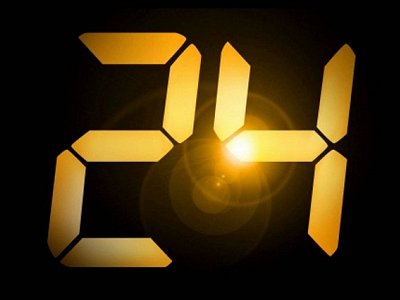
THE CLOCK RUNS OUT FOR JACK
There are only a certain number of times one man can save his country. As the final screen disintegrated on 24’s Jack Bauer in series eight, what legacy did he leave us?
Few programmes have captured the zeitgeist as presciently or shaped the contours of modern drama as much as 24. Its novelty lay in a real-time format and the use of split screen narratives. The first series about the kidnapping of a counter-terrorist officer’s family was being scripted when 9/11 happened, meaning one early scene of the destruction of a passenger plane was cautiously edited to avoid causing distress. By the time the second series was commissioned, 9/11 had opened to the makers a rich narrative field of mortal threats to US security. People were speculating for the first time about the likelihood of a nuclear weapon being detonated in a major US city or the release of terrible biological weapons in crowded areas. And they were also talking about the use of torture to obtain evidence. 24 spent seven further series exploring the dark side of counter-terrorism.
An audit of the drama is mixed. It sustained remarkable tension and allowed the character of a decent but complex man to be moulded for the worse by over-exposure to violence and heart-rending dilemmas. Jack Bauer was no one-dimensional action hero; he opened up the reality of what state-sanctioned violence towards others does to your well-being. This is a truth we find hard to come to terms with, evidenced by the difficulty we have in re-integrating some ex-servicemen and women into ordinary life.
The series also pursued a consistently right-wing view of the war on terror, which was unusual for Hollywood. The writers were careful to ensure that Islamic extremists were never alone in their hideous plans, thus protecting themselves from charges of incitement. Yet complicity usually lay with elements in the US Government itself, confirming the prejudices of radical anti-state movements like the Tea Party amongst whom Washington’s mere existence is confirmation of a conspiracy against the people.
But most of all there was the torture. The use of pain to obtain evidence was usually shown to work. It was alleged with some force that George W. Bush, Donald Rumsfeld and Dick Cheney were devoted fans of the series and while there is only speculation they took their philosophical lead from 24’s use of coercion, it is well known that guards at Guantanamo Bay would watch 24 before and after interrogating captives. This led the producers to promise they would reduce scenes of torture and show that it produces false evidence too. They never managed this.
I have listened to people argue the case for torture where evidence extracted would save lives and this utilitarian case probably has a footing among some Christians, even though every tool of faith available to us warns us against abusing others. These are not things we choose to discuss in church. The shakiness of our common grasp on these tools of faith (Scripture, informed by tradition and reason and supported by prayer) means we are often unprepared to deal with the moment of crisis when it emerges and we deal with it by looking the other way.
Opposition to the use of torture is not naïve. Not only is it morally wrong to inflict deliberate pain on someone who is made in the image of God and for whom Christ died, it is a very unreliable process, as distinguished soldiers like Mike Jackson and Charles Guthrie have argued. People will make up stories to be relieved of torture, which makes it harder to get to the truth. The infliction of pain has a dehumanising effect not just on the one who suffers, robbing them of their trust in human benevolence, it profoundly diminishes the character of the person who inflicts it. There is also a tangible risk that once a line is crossed, it becomes progressively easier to transgress and torture comes to be used routinely, as we see in many despotic regimes.
Graham Allison, a respected Harvard academic who served as special advisor to Presidents Reagan and Clinton on nuclear security, observes: ‘a nuclear terrorist attack on America in the decade ahead is more likely than not’. He said that in 2005. You do not have to be a particular breed of neo-conservative to believe there are large and credible threats to western security. If perpetrated, these would alter the way we choose to be civilised. Unless, that is, we prefer to be guided in our common life by the God for whom the nations are like a drop from a bucket (Isaiah 40:15).
Thankfully, we find our hope in Psalm 46:
He makes wars cease to the end of the earth;
He breaks the bow, and shatters the spear;
He burns the shields with fire.
Be still, and know that I am God!
I am exalted among the nations…
The God of Jacob is our refuge.
As for Jack, his followers could only wish him peace at last. But with a film in the making, I think this is one hope we may have to forego.
POPULAR ARTICLES

Obama's Covert Wars
The use of drones is going to change warfare out of all recognition in the next decades.

Through A Glass Starkly
Images of traumatic incidents caught on mobile phone can be put to remarkable effect.

What Are British Values?
Is there a British identity and if so, what has shaped the values and institutions that form it?


